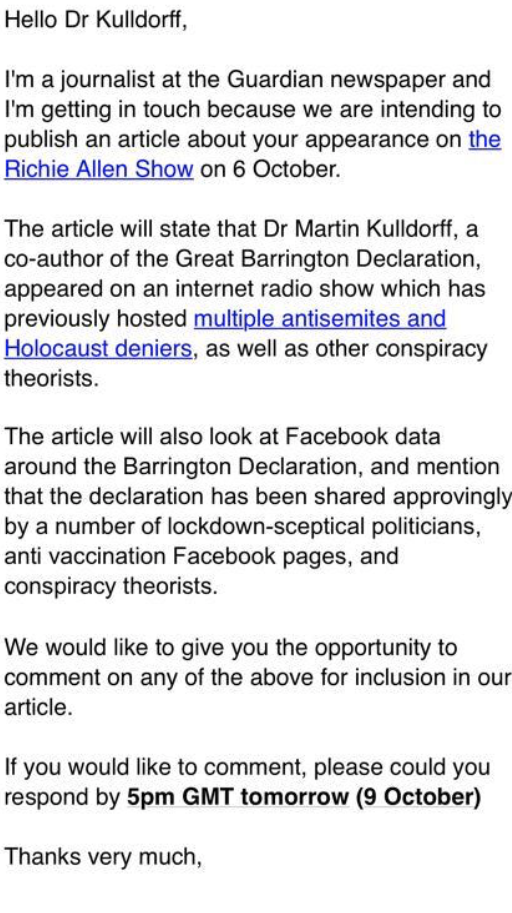Last night The Guardian sent the following email to Professor Martin Kulldorff of Harvard, one of the three initial signatories of the ‘Great Barrington Declaration’ calling for a different approach to the Covid-19 pandemic.

The article is yet to be published, but it looks very much like a move to delegitimise the ideas of these eminent scientists by smearing them by association. As Professor Kulldorff told The Guardian, he had never heard of the ‘Richie Allen show’ before he was invited on, and as a public health expert, he thinks it’s his duty to talk to all audiences in any case, whatever their beliefs.
I hadn’t heard of the show either (the website looks like lots of conspiracy theories), but is the fact that Kulldorff appeared on it really the big story? Surely the right thing for a newspaper to do is to engage in good faith with the arguments being presented, rather than to impugn integrity using Facebook shares as some sort of hard evidence.
This sort of thing is happening more and more often. Professor John Ioannidis at Stanford was subject to an extraordinary smear campaign after his ‘Santa Clara County’ study into seroprevalence. Buzzfeed even went so far as to imply financial wrongdoing on the basis of a $5,000 contribution by someone in the airline industry. The idea that a world-renowned academic would throw away his career for a $5,000 donation is absurd, and Stanford’s own investigation concluded that there was no conflict of interest whatsoever. But the rumour remains — the mud has been thrown and his reputation has been successfully tarnished.
I don’t buy into any of the conspiracy theories around the pandemic. Not 5G, not Bill Gates, not ‘Plandemic’ — I think we got into this mess with lots of frightened people trying to do the right thing with bad information, and lots of weak political leaders without clear values trying to protect their reputations. It’s more banal but, to me, just as alarming as any conspiracy.
Surely it would be better for powerful organisations like The Guardian to accept that these scientists are sincere and accomplished and are simply taking a different view as to how best to defend the greater good. The smear approach is a weak way to attempt to win any argument.











Join the discussion
Join like minded readers that support our journalism by becoming a paid subscriber
To join the discussion in the comments, become a paid subscriber.
Join like minded readers that support our journalism, read unlimited articles and enjoy other subscriber-only benefits.
Subscribe